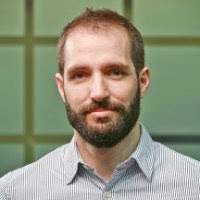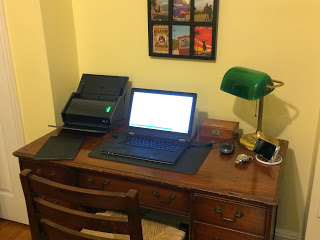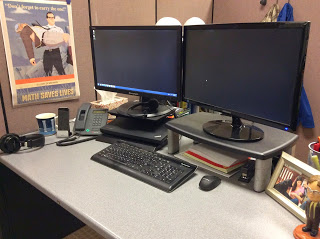I am Jeff Weidner and This is How I Work
 Today, I am interviewing Jeff Weidner for the “This is How I Work” series. Jeff is a structural engineer originally from Maryland, though he has lived in Pennsylvania for 15 years. He is married to an amazing woman who is finishing up her residency and they have a ten month old son, and a very jealous dog. He is happy in industry for now. He comments that he is getting great experience and exposure, but eventually wants to move to academia.
Today, I am interviewing Jeff Weidner for the “This is How I Work” series. Jeff is a structural engineer originally from Maryland, though he has lived in Pennsylvania for 15 years. He is married to an amazing woman who is finishing up her residency and they have a ten month old son, and a very jealous dog. He is happy in industry for now. He comments that he is getting great experience and exposure, but eventually wants to move to academia.
Current Job: Practice Lead for Research at Intelligent Infrastructure Systems (www.iisengineering.com)
Current Location: Philadelphia, PA
Current mobile device: iPhone 5S
Current computer: Lenovo Yoga 11”
Can you briefly explain your current situation and research to us?
I work for a small company that addresses challenging infrastructure problems where traditional methods have generally failed. We are primarily focused on bridges in the United States, though we do some international work. We design and install structural health monitoring systems, do structural testing, advanced finite element modeling, asset management and applied research.
I work primarily on research contracts in the public sector, but have recently gotten involved in expanding to other markets. Of particular interest to me is the interaction between infrastructure and the rising domestic energy markets, as well as the psychological and societal side of infrastructure systems in the U.S.
What tools, apps and software are essential to your workflow?
The most ubiquitous software/app in my day to day workflow is Evernote. For work, I use Evernote primarily as a database of whatever I come across that I find relevant. The most important notebook I maintain is my references, where I keep a copy of any journal paper I read and find valuable. Evernote makes the PDFs searchable, allowing me to construct searches first through my database before going to an online database. There is also a robust web clipper function and it seems that almost all applications can share to Evernote. To manage Twitter content, I set up a recipe in IFTTT to grab any tweets I favorite or retweet and save the content in Evernote. I also use Evernote in my personal life to pretty much keep track of everything. I am not quite paperless, but not far off.
What does your workspace setup look like?
My workspaces at home and the office are kept fairly clean and austere. I read once that how you maintain your office says a lot about you to your peers on a subconscious level, so I keep it clean. I have a few family pictures, a poster explaining common logical fallacies, and a Dwight Schrute bobblehead at work, but that is it. I use two monitors there, but just use my laptop at home, on an old sewing table. I have attached a picture of my home workspace, inclusive of my baby monitor.
 |
| Home office |
 |
| Office setup |
What is your best advice for productive academic work?
I guess it depends on how you define productive work. For me, everything revolves around the publications. When I started my PhD I assumed the papers would come in time. I thought pulling papers out of my dissertation would be easy when I finished. What I realize now is that writing a dissertation around several journal papers would have been a lot easier. Basically all that stuff you want in the paper, but have to cut for length just goes in the dissertation. To clarify, I am not talking about quantity of papers, though sadly that is important too. I am talking about the importance of graduating with a bare minimum of 2-3 quality papers that have been submitted to solid journals. Very few will read your dissertation, but hopefully many will read the papers.
How do you keep an overview of projects and tasks?
For personal and work task management I use Wunderlist on all my devices. It’s a nice service that syncs well and looks pretty. There are a million comparable options out there, and I have tried many. The tricky part is sticking with one. I have used iOS reminders, Astrid, Producteev, Evernote reminders, Remember the Milk Pocket Informant. The list goes on and on. Now it’s Wunderlist. I am just hoping I can keep it up. For projects, I use the standard Microsoft Project, combined with an old fashioned whiteboard.
Besides phone and computer, do you use other technological tools in work and daily life?
I swear Evernote is not paying me, but I love my Fujitsu ScanSnap scanner – Evernote themed of course. That is how I get rid of most of my paper. I love my iPad but I could get along without it as well.
Which skill makes you stand out as an academic?
I think I have a knack for placing ideas and problems in context, and maintaining an applied research mindset when looking for solutions. I work in a pretty specialized area with bridge instrumentation and structural health monitoring, so I actively try to keep my interests a little more broad. Lately, since it has been all over the news, I have been closely following the political circus that is infrastructure funding. This feeds into my research interests because if you can understand the root cause for a behavior, be it structural performance, political posturing, or societal upheaval, then you can begin to recognize real solutions.
What do you listen to when you work?
Most anything without words. Our office is incredibly loud, so generally I have either movie scores, or classical piano playing through giant headphones. I like Ludovico Einaudi a lot, and Helen Jane Long.
What are you currently reading?
I read during my commute, but right now I am using that time to take a class through Coursera on Teaching at the University level. Reading books for pleasure is a dangerous game for me. I will just use every second of free time to read. When I finish, at like 4am, then I just feel stupid for not sleeping or getting anything else done.
Are you more of an introvert or extrovert? How does this influence your working habits?
I am most definitely an extrovert. Day to day I do not think this makes much difference to me, but when it comes to interacting with clients, giving presentations, or big meetings, it definitely helps. Even so, cold call networking at conferences and events is always a struggle.
What’s your sleep routine like?
I have a ten month old son, so while it is not as bad as it was when he was a newborn, I find that I am sleeping a lot less than I used to pre-baby. Five to seven hours a night is typical. Sometimes I lean back in my chair at work and take a little ten minute nap too.
What’s your work routine like?
I try to break the day up into four chunks. First thing, I do exactly what you are not supposed to do and catch up on emails, as well as make sure the rest of my day is planned out. Then I try to dedicate each ensuing chunk of 2-3 hours to a single project. Working on project all day often kind of sucks, depending on the project, so I avoid that when I can. I use Toggl to track my activities and hours.
What’s the best advice you ever received?
Years ago my Master’s advisor pulled me aside one day about halfway through my work with him. I was missing deadlines, struggling in his class, and generally slipping across the board. We had the following conversation.
Advisor: “You think you are working as hard as you can, correct?”
Me: “Yes.”
Advisor: “Well you’re not.”
Me: “….”
This struck a chord, and has stuck with me, primarily because he was right. Once I recognized that the problem was me, and not the work, it became much easier to control my bad habits. Later, when I relayed my anecdote to my PhD advisor, he articulated it better. The best thing you can do for yourself is to learn to see yourself objectively, as others do.
